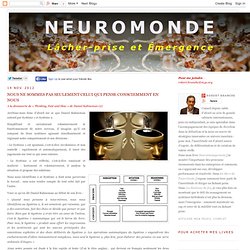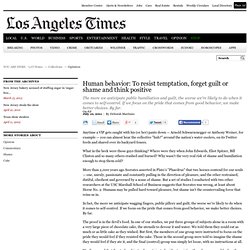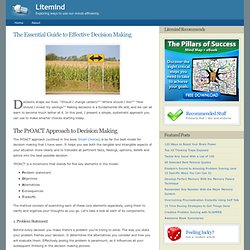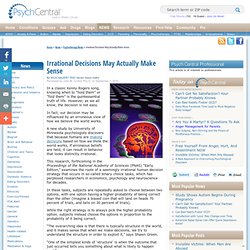

Un superordinateur en quête du sens commun. L'étude des comportements peut-elle permettre de les changer ? NOUS NE SOMMES PAS SEULEMENT CELUI QUI PENSE CONSCIEMMENT EN NOUS. A la découverte de « Thinking, Fast and Slow » de Daniel Kahneman (2)

Comment-transformer-un-perdant-en-battant - olivier-schmouker. L'important est de travailler la perception que l'on a de soi...

Photo : DR. BLOGUE. Vous comme moi, nous avons déjà butté contre des personnes qu’il était impossible de faire changer d’idée. Nous avions beau leur démontrer par A+B qu’ils étaient dans l’erreur et qu’il vaudrait mieux, pour eux comme pour les autres, qu’ils voient les choses autrement, nous nous heurtions à un mur d’incompréhension. Et nous nous sommes alors dit : «Peine perdue»… Pourtant, il y avait moyen d’arriver à nos fins. Human behavior: To resist temptation, forget guilt or shame and think positive - latimes.com. Anytime a VIP gets caught with his (or her) pants down — Arnold Schwarzenegger or Anthony Weiner, for example — you can almost hear the collective "huh?

" around the nation's water coolers, on its Twitter feeds and shared over its backyard fences. What in the heck were those guys thinking? Where were they when John Edwards, Eliot Spitzer, Bill Clinton and so many others crashed and burned? Why wasn't the very real risk of shame and humiliation enough to stop them cold? Curieux comportement si notre premier choix est non disponible. What guides how much people pay at pay-what-you-want restaurants? - Barking up the wrong tree. What-motivates-us-more-than-most-anything-els from bakadesuyo.com. Does Your Language Shape How You Think? Horacio Salinas for The New York Times In particular, Whorf announced, Native American languages impose on their speakers a picture of reality that is totally different from ours, so their speakers would simply not be able to understand some of our most basic concepts, like the flow of time or the distinction between objects (like “stone”) and actions (like “fall”).

For decades, Whorf’s theory dazzled both academics and the general public alike. In his shadow, others made a whole range of imaginative claims about the supposed power of language, from the assertion that Native American languages instill in their speakers an intuitive understanding of Einstein’s concept of time as a fourth dimension to the theory that the nature of the Jewish religion was determined by the tense system of ancient Hebrew. Eventually, Whorf’s theory crash-landed on hard facts and solid common sense, when it transpired that there had never actually been any evidence to support his fantastic claims. The Essential Guide to Effective Decision Making. Decisions shape our lives.

“Should I change careers?” “Where should I live?” “How should I invest my savings?” Making decisions is a fundamental life skill, and we can all learn to become much better at it. In this post, I present a simple, systematic approach you can use to make smarter choices starting today. The PrOACT Approach to Decision Making The PrOACT approach (outlined in the book Smart Choices) is by far the best model for decision making that I have seen.
‘PrOACT’ is a mnemonic that stands for five key elements in the model: Problem statementObjectivesAlternativesConsequencesTradeoffs The method consists of examining each of these core elements separately, using them to clarify and organize your thoughts as you go. 1. Behind every decision you make there’s a problem you’re trying to solve. In spite of its importance, many of us just skip this step altogether: it’s too easy to state problems as they come to our minds. Want an example? 2. 3. Indeed, it’s much easier (and fun!) How to Make Great Decisions in Life: Top 5 Practical Insights. Making great decisions can be tricky: there are many hidden traps and potential roadblocks you need to be aware of.

Here are 5 practical, actionable insights to help you make the best possible decisions to improve your life. 1. Irrational Decisions May Actually Make Sense. By Rick Nauert PhD Senior News Editor Reviewed by John M.

Grohol, Psy.D. on September 1, 2010 In a classic Kenny Rogers song, knowing when to “hold them” or “fold them” is the quintessential truth of life. However, as we all know, the decision is not easy. In fact, our decision may be influenced by an erroneous view of how we believe the world works. A new study by University of Minnesota psychologists discovers that because humans are making decisions based on how we think the world works, if erroneous beliefs are held, it can result in behavior that looks distinctly irrational.
This research, forthcoming in the Proceedings of the National Academy of Sciences (PNAS) “Early Edition,” examines the roots of a seemingly irrational human decision strategy that occurs in so-called binary choice tasks, which has perplexed researchers in economics, psychology and neuroscience for decades. Source: University of Minnesota APA Reference Nauert, R. (2010).